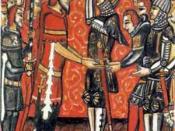Book Report: F.L. Ganshof's "Feudalism"
Feudalism, a political economic system, was based upon several factors in which worked to make the system work. The main element that kept feudalism together was the seizing of all land in fee. This resulted in the trade for protection from a "lord" in return for homage and allegiance. The basics to the system are basically a type class ordeal. A man with power took delivery of the title lord, and was vowed to by any men below him. The so-called pledges are noted as charters; therefore each man maintains knowledge of his definite obligations. These obligations are entailed from the trade, which states that the pledge must serve and respect the lord in any way probable, and the lord must fully support his pledge. In supporting his pledge, a lord is required to provide all food, clothing and living statures. As for the man serving and respecting his lord, he must work on accomplishing this while at the same time politically remaining a free man.
Overall the system of feudalism was an organization process in which relied on both power and lack there of.
The book goes into description about feudalism's time period and the different ways in which it is practiced. It is a European system and was pursued mostly from the ninth century, to the thirteenth century, as the book explains. Starting with the first chapter, Ganshof begins to go into detail about the earliest form and constructions of feudalism from the sixth and seventh centuries, to where the book concludes at the later stages past the thirteenth century. Back to the origins of the scheme the Merovingian Period was known as the starter for feudalism. Looking over the first chapter alone, Ganshof is sure to include a lot...


